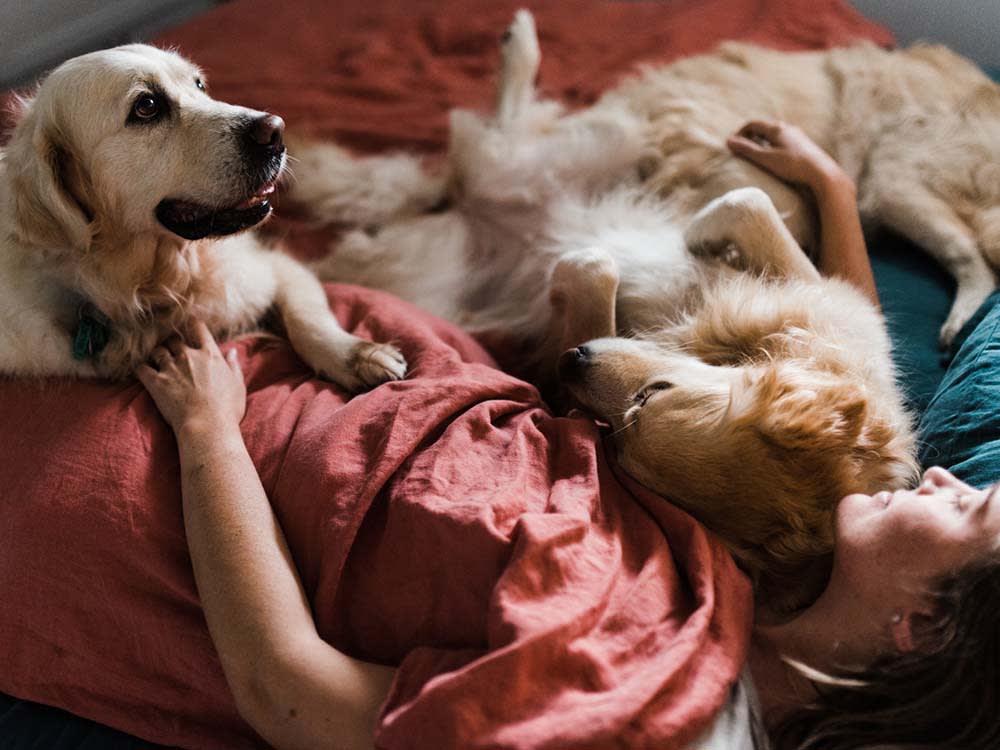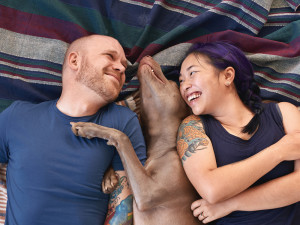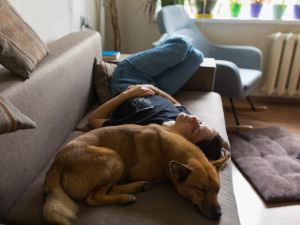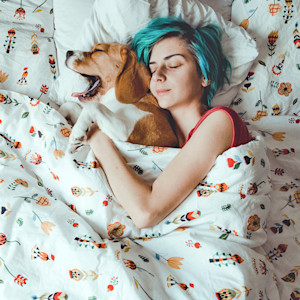13 Reasons You Should Let Your Dog Sleep in Your Bed
It’s science (and adorable).

Share Article
The debate over whether or not dogs should sleep in the same bed as their humans can be kind of polarizing. Some think it’s an awful idea that leads to decreased sleep and allergy attacks — but others are enthusiastically pro-bed sharing, arguing that the adorable snuggles outweigh the disruptive snores.
It turns out the yay-sayers might be onto something. Research has found that there are several reasons sharing a bed can be a healthy and positive experience for people and pets alike. For example, sharing a bed with a pup has many mental health benefits, including increased feelings of safety and comfort. In one study, people suffering from PTSD found that sleeping with their pet even helped diminish nightmaresopens in new tab.
And there are physical benefits, too. Sleeping with your dog releases oxytocin, the feel-good chemical in your brain that promotes REM sleep. In other words, you may be achieving deeper, more restful sleep when you keep your pup close.
Of course, the choice isn’t right for everyone — light sleepers, we get it. If you sleep lightly or just really value your space, it’s perfectly fine to let your pet crash nearby in their own bed. But if you’re on the fence, consider these benefits and drawbacks of bunking up with your dog.

Health benefits of sleeping with your dog
It reduces depression.
Contact with dogs increases the flow of oxytocin, the love chemical. Research has shown that spending even just minutes each day petting a dog increases the “feel-good” hormone — serotonin a natural depression-fighting chemical.
It promotes theta brainwaves.
The release of oxytocin promotes theta brainwaves, which occur during REM sleep.
It increases your sense of security.
In one study, having a pet dozing in the same bed improved sleep qualityopens in new tab for women. A dog may provide certain pet parents with a sense of security and purpose which can be crucial to fighting mental health issues such as depression.
It eases insomnia.
Sleeping with a dog mitigates anxiety, allowing you to relax and fall asleep.
It reduces bad dreams.
Research has shown that support animals diminish nightmares in PTSD patients.
It decreases loneliness.
In a studyopens in new tab, 41% of pet owners said sleeping with their pet provides companionship. Dogs make us feel better about ourselves. Pet parents are found to exhibit better self-esteem, less fearfulness and greater social support that may help ease and prevent anxiety.
It improves sleep quality.
Sleeping with your dog results in a higher sleep efficiency score.
It reduces stress.
In a surveyopens in new tab, 74% of pet owners reported improvement in their mental health from pet contact. What’s more, even the most highly stressed dog parents see their doctors 21% less than non-dog parents.
It lowers your blood pressure.
Human-dog interaction (like petting and touching) leads to lower pressure readings.
It strengthens your bond.
Sleeping together helps your dog trust you and may even make training easier.
It keeps your heart healthy.
The American Heart Association found a link between pet interaction and decreased hypertension. In one study, pet parents had a significantly smaller increase in heart rate and a faster recovery in response to stressful situations. It was even faster when the dog was physically in the room with them.
It reduces allergies later in life.
One studyopens in new tab found infants who slept with their pets were less likely to develop allergies.
It improves your health overall.
A major study of nearly 6,000 participants found that pet parents have lower blood cholesterol and triglyceride levels than non-dog parents.
When Sleeping with Your Pup Doesn’t Make Sense
Sleeping with your dog isn’t right for everyone. Circumstances when you might want to avoid it include:
If your dog isn’t house-trained.
If you have severe allergies.
If you are crate-training a new dog.
If you (or your dog) have health issues that would be exacerbated by sleeping together.
If you are a light sleeper.

Daniela Lopez
Daniela Lopez is a digital media specialist and long-time contributor to The Bark.
Related articles
![Happy pet owners cuddling with their dog]()
How to Spark Joy in Your Dog’s Life
(And your own, while you’re at it.)
![Shiba inu dog sleeping in bed]()
My Dog Sleeps All Day—Is That Normal?
Dogs need more sleep than humans. Here’s how much is healthy.
![Woman wearing a black t-shirt and jeans laying on the couch with her dog taking a nap]()
What Are the Effects of Sleeping With Your Dog in Bed?
There are pros and cons of sleeping with your dog—for both of you.
![Woman sleeping in bed with her beagle dog.]()
Does Your Dog Get a Bad Night’s Sleep When They Share a Bed With You?
You might be stealing all the covers.
Why Do Dogs Always Take Up the Entire Bed When They Sleep With You?
You're just trying to get some Zzzs.







